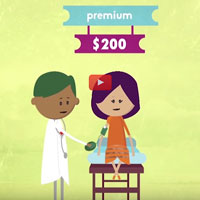Financing Your Youth’s Adult Healthcare
Families of transition-age youth often have years of experience dealing with healthcare coverage issues and co-payments, specialized equipment, home adaptation, and other health-related expenses. However, when youth become adults, there are brand new issues to deal with.
Planning ahead is critical. Young adults are at risk of losing healthcare coverage at 3 critical points in their transition to adulthood:
- when they turn 19
- when they graduate from high school or college, or
- when they change jobs.
It is reassuring to know that there is national network of family health advocates and other programs that can help youth with disabilities and their families understand the health insurance options that are available to them.
Co-pay? Co-Insurance? Confused?
Recommended Resources for Information on Healthcare Financing:
- HealthCare.gov Health Insurance Marketplace, also known as the health insurance exchange, helps uninsured people who do not have coverage through a job, Medicaid, or another source find health coverage that meets their needs and budget.
- Family-to-Family Health Information Centers are family-staffed organizations that assist families of children and youth with special health care needs and professionals who serve them. F2Fs provide support, information, resources, and training around healthcare funding, family support, and related issues. There is a F2F center in every state.
Meeting the Health Insurance Needs of Your Young Adult with a Disability: Questions to Ask *
- Is adult dependent coverage beyond age 26 allowed on a parent’s existing job-based group plan or private insurance plan? Does it meet the criteria below or will your son or daughter need a different plan to meet their needs?
- Does the plan allow you to use the specialists that youth need?
- Which hospitals can you use?
- Does the policy cover the type of medicines youth need?
- Does the plan cover the specific procedures and therapies youth need?
- Does the plan limit the number of times per year that a certain item or procedure will be covered?
- Does the plan cover assistive technology?
- Does the policy cover assessment for mental and physical disorders?
* This list is found on the Medical Home Portal website.
This video from Healthcare.gov is a helpful general resource: How to Choose a Plan in the Health Insurance Marketplace
What health insurance options are available?
Your youth’s options for health insurance coverage depend on several factors, including age, state of residence, income level, employment status, and other personal circumstances.
Options include:
- Staying on their parents' existing family plan until youth is 26 years old. Family plans may also offer Dependent Disabled Adult coverage beyond age 26 if an adult child is incapable of self-sustaining employment due to disability and dependent on the policyholder for care and financial support.
- Job-based insurance coverage where employers offer group plans to employees.
- Student health insurance: some postsecondary schools offer health insurance to their full-time students.
- Medicaid coverage for individuals with low incomes and some people with disabilities (eligibility requirements and covered services vary by state). Former foster youth qualify for Medicaid coverage until they are 26 years old.
- Private insurance where an individual purchases their own insurance plan. The deductibles, co-insurance expenses, and maximum limits on coverage can vary a great deal. The best place to compare insurance plans is on state Health Insurance Marketplace websites, where people can compare rates and find out if they are eligible for discounts based on income.
In general, plans that offer lower monthly premiums have more limited coverage and higher deductibles and co-insurance costs. People who pay low premiums may find themselves responsible for a large portion of their medical costs if they are injured, become sick, or have a chronic medical condition or disability.
| Private | Government Funded | No Insurance |
|---|---|---|
PrivateJob-Based Group Plans Young adults who work 30 or more hours per week will qualify for a job-based group plan themselves, if offered by their employer. COBRA College/University Student Health Plans Marketplace (ACA)
The Kaiser Family Foundation’s easy-to-understand Health Insurance Marketplace Calculator estimates eligibility for subsidies and cost of health insurance based on income, age, and family size. |
Government FundedState Public Insurance
Find more information about Medicaid for young adults age 18 and older. Federal Public Insurance Indian Health Services TRICARE |
No InsuranceYou Pay All the Bills
You Pay Penalty Tax
Low Cost Options
|
What costs are covered individuals responsible for?
Youth who qualify for their own health insurance coverage as independent adults will be responsible for:
- Co-insurance, co-payment, deductible, and premium expenses.
- Co-pay cost for prescription medicine.
- The cost difference between seeing a provider in-network and out-of-network.
It is important for individuals to know the number of visits allowed under their insurance in order to plan for certain services, such as physical therapy or home health care. Youth will have to pay for visits above the allowed amount if they have not had the additional visits pre-approved beforehand. Families can help youth understand and follow their insurance plan’s requirements.
Videos

Understanding Your Health Insurance Costs

How does student health insurance work?

Words to Know – from Coverage to Care
For more videos on this topic, visit our Videos page.
PACER Resources
The following resources were developed for families in Minnesota but contain general information that is applicable to youth in any state.
- Private Insurance
- Affordable Care Act
- Understanding Your Health Insurance: Certificate of Coverage and Survey of Benefits
- Is Your Health Plan Self-Insured?
- Transition Health Plan for Youth with Disabilities and Their Families
- Medicaid for Young Adults Age 18 and Older
Additional Resources
- Financing Your Child’s Health Care explains financial assistance resources for the care of children with special health care needs and their families.
- Getting Covered if You are Under 30 is a set of frequently asked questions about the government’s insurance marketplaces and how young adults can enroll in insurance plans.
- Facts for Families: Mental Health Insurance provides useful questions to ask when evaluating the mental health benefits of an insurance plan.
- Does Your Health Insurance Cover Mental health Services? provides information about mental health coverage under the mental health parity law.
- Access to Mental Health Care provides links to adolescent mental health resources and a library of materials from the Office of Adolescent Health, U.S. Department of Health and Human Services.
- The Partnership for Prescription Assistance helps low-income, uninsured patients get free or nearly free brand-name medicines.
- Your Insurance Card is a one page information sheet that presents an example of an Insurance Card along with instructions on how to read its crucial information.
- Young Invincibles FAQs provide answers to questions on health care coverage and the Affordable Care Act that are frequently asked by young adults and their parents.


